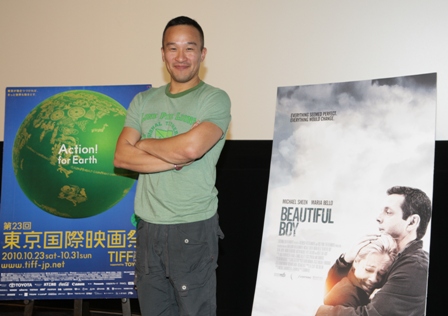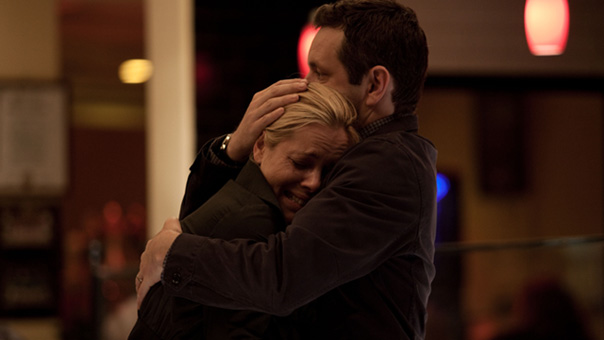2010.10.28
[Event Reports]
10/28 (Thu) Q&A - Competition "Beautiful Boy" Shawn Ku (Director)


©2010 TIFF
American director and writer Shawn Ku's new film Beautiful Boy tells the story of a husband and wife who must deal with the aftermath of their 18-year-old son's murderous rampage during his freshman year at college. With a feeling similar to a documentary, the drama, featuring Welsh actor Michael Sheen and American actress Maria Bello, explores the emotional and physical strains placed upon a family following such a tragedy, one whose impact is seemingly never ending.
Ku was on hand at the Toho Cinemas Roppongi Hills for a screening on Thursday. An enthusiastic group of film fans were in the audience to ask him questions afterward.
Q: Before we start the Q&A, could you offer some opening words?
Shaun Ku (SK): I don't know what to say. Thank you all for coming out so late to the screening. Thank you for staying.
Q: Good evening. Why did you choose Beautiful Boy for the title? Did you have any particular thoughts or a concept in mind?
SK: I think the significance of the title is how the parents tried to maintain the idea of their son alive. They are trying to keep that idea of him as a beautiful person. I don't think there is any parent who has a child who, no matter what they do or how bad [they are], that doesn't want to maintain some idea of the beauty of their child.
Q: You knew from the beginning that you wanted that title?
SK: No, not from the very beginning. Definitely, it was something that came eventually. But it was always going to be a story about the parents and not about the child, not about the shooting. It was always going to be about their relationship. But I guess we came to realize that as much as we wanted it to be just about the parents it is hard to avoid the child. He's in a very small part of the movie and yet he has a presence over the entire film.
Q: Welcome to Japan. Thank you very much for the wonderful film. His parents may not be ideal but his mother seems to be a warm person and the father is a hard-working man. So I kept wondering: Why did he have to do that [the shooting]? And I think the son loved the parents too and he did not grow up in such a bad environment. So I would like to know your motivation. Why did he have to do that?
SK: I think for us the thought was, not just for parents and children, but for anybody in a family, there is a level that you know somebody. I think there is more that you don't know. We are not saying that it is the parents' fault at all. It is just that there comes a time in life when things happen and you don't know why, and I think that is sort of the point of the movie to a certain extent. They are searching for a reason why, and they'll never know completely what their son was doing or going through because they weren't that kind of family that talked about those things. I think there are few families that are that open. That is sort of the kernel of it.
Q: I am an American citizen and I have seen a lot of this on the news about school shootings, and I just wanted to know personally what exactly influenced you. Was it something personal to you or what?
SK: Well, as I said, the story is intended to be an exploration of families and how well you really know somebody that you are intimate with. But for me personally, the inspiration comes from two places. When Virginia Tech happened it was very traumatic for my family to a certain extent because both of my parents went to school there. They met there. My sister was born there. And also because he [the shooter] was Asian, it was very personal. Even though we didn't lose anyone [relatives or friends] in the shooting, it was oddly personal. Also, subsequent to that, a close friend died in my home. He was just visiting. It was a completely unexpected death in his sleep. I got drawn into his family's grief and became a pivotal witness to their grief and the spiral of their grief. So it was really the synthesis of those two things.
Q: I would like to ask about the actors. One of the appealing things about this film is Michael Sheen's acting performance. It is really superb. I would like to know about your casting process.
SK: They [Sheen and Bello] were both my first choices, obviously. It was difficult to get to them, as it is [usually] with two big actors. But once we got through all of the guards and the red tape, and they actually got the scripts, it was very easy once they read the material. I thought I would have to convince them but there was no convincing. They worked for nothing. Our budget was very low, and they felt passionate about the project. So I was grateful for that. Yeah, he [Sheen] is a fantastic actor.
Q: It's a really wonderful story that you have shared with us. Like Harvey Keitel's appearance in Tarantino's early film Reservoir Dogs, a world-famous star has appeared in a film of an up-and-coming filmmaker. I think this is very hopeful for any aspiring filmmakers who might be here. So could you share with us the secret or tip to getting a big star to appear in a film?
SK: I personally did very little persuading. It was all from the material. I think actors like these are driven by their desire to play different characters. I think he [Sheen] had never played an American before. He had never played this kind of role. His roles until then had been Tony Blair and things that are a little lighter. He played vampires and werewolves but never anything as sort of small and human as this. When he and I spoke it was something that he understood very deeply. I feel that our childhoods are very similar. We understood each other on a very basic human-understanding-of-life [level] and philosophy. Raising children and broken families ŌĆō it was a very easy thing for him to understand.
Q: Thank you very much for a wonderful film. Your cinematographer, Michael Fimognari, is someone I am very interested in. This film has some very unique camera work. Was this due to him or you or a combination? Can you explain how this came to be?
SK: We spent several months before [the beginning of] shooting talking about what the movie was. [We were] watching other movies and stealing from what we liked and squishing it together into one thing. But we wanted the story to feel very real. Like in that movie United 93, you've got this feeling when you watch that movie that a documentary crew was there following these people and then something happened and they were stuck in the middle, sort of watching it. I remember seeing a documentary on 9/11. A documentary crew happened to be following a fire department, just doing a silly documentary about that, and then 9/11 happened - they were caught in the middle of this insanity. I thought about in those terms: If someone was in the room while this was happening, how would the camera feel? [We] almost gave the camera a personality. Like if you are in a party and two people are talking. Then suddenly they are having an argument and you are stuck in the corner. What does that feel like? What would the camera feel like? We had various terms, there was "nervous camera" and we had "fly on the wall." For example, when Maria is sleeping in the bedroom, it didn't feel right to come up and be right in her face. If someone is sleeping you'd sort of sneak it from outside the doorway. It was a lot of those kinds of thought processes to give the camera a personality.
Q: Thank you for bringing such a great film. At the risk of sounding like a cliché, I want to ask your ethnicity. I noticed your last name sounds Korean. There were some Korean actors [in the film]. I am Korean as well. IŌĆÖd also like to ask about your research process. I just want to know why you approached it [the way you did].
SK: I am actually not Korean. I am of Chinese descent. My parents are from China. But I was in LA [Los Angeles] when Virginia Tech happened. I have a lot of Korean friends. It was very difficult for them. They were like, "Oh, God, why did he have to be Korean?" It was so [difficult]. I don't know why. I guess maybe because there is already racial tension in Los Angeles under the surface and I know that brought out a little bit more for a moment. It was everywhere, that sort of tension. In terms of the research, it wasn't easy to get access to people. I thought it was very interesting when I was doing research on the parents of these various shooters ŌĆō there are so many as you had mentioned ŌĆō that many of them disappear. They pick up and move and sort of go into hiding. I thought that was very interesting and sad that someone would have to leave their home. To a certain extent that was the extent of my research. It was just trying to empathize with that as much as I could [and] we could. In terms of the approach, we never wanted it to be a sensational movie. It was really always meant to be ŌĆō for lack of a better word ŌĆō a love story under the cloud of this thing [the tragedy]. But hopefully a love story is the thing that comes through.
I will add one more thing. A couple of weeks before we started shooting, Oprah magazine "O magazine" came out with an article with Susan Klebold [the mother of one of the shooters at Columbine]. It was the first time she had ever spoken. After reading that article, Maria was very excited because we had already started our work and she felt very connected to that story, how personal it was for her. But I felt like at least we were on the right track because [in] reading that article [I could see that] she was very protective of her son. She defended him and sort of maintained that he just fell in with a bad crowd and was still a good boy and they had a very good relationship and all of these things. Me reading between the lines, [I] just saw how, even so many years later, how desperately a mother needs to protect her son.
Beautiful Boy

© 2010 Goldrush Entertainment
Film Information



